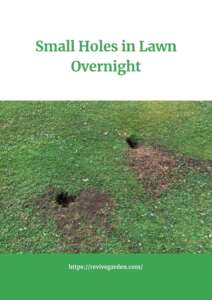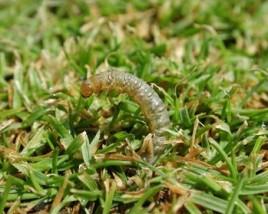Table of Contents
 One morning, you wake up and make a cup of tea. You wanted to enjoy a cup of tea on a green carpet on your lawn. But what is this? It’s a new day, and there are new holes in your lawn. What do they mean? It happened overnight.
One morning, you wake up and make a cup of tea. You wanted to enjoy a cup of tea on a green carpet on your lawn. But what is this? It’s a new day, and there are new holes in your lawn. What do they mean? It happened overnight.
If you’ve noticed small holes in your lawn, it might be time to intervene. But you must not be aware of the solution and the causes. Here we are. In this article, we’ll talk about some of the most common causes of small holes in lawns and what damage they cause.
This guide will help you identify what caused those holes in your lawn so that you can take action to fix the problem.
Small Holes in Lawn Overnight – Is it a Dream
Small holes in the lawn are quite common. These are not dangerous. Small holes in your lawn usually happen during the hot summer months. It may happen to small animals or big animals. You may notice it by checking the size of the hole. If it’s big, you were made by some big animals, who only like the flavor of some plant in your garden. If it is so, he will keep coming and digging in your territory. Sometimes you find small holes around your green carpet; it signifies that some small animal has held this activity.
Prevent your Lawn from Wild Activities:
Suppose you intend to deprive these animals of digging or stopping them from such activities, which may cause hundreds of dollars to repair, consider the time of the day, the season, and the size of the hole. Some insects actively dig after the transformation from larva into adult. They dig holes to make their way out from the soil to the surface. Some animals are habitual digging for habilitation, rescue plea, underlying prey, or nesting. Before looking forward to the solution, the following are wise reasons for holes in your lawn.
Reasons of Holes
If you don’t have pets or other animals on your property and the damage seems random, then it might be caused by:
Voles
Voles are small rodents that burrow into the soil to create nesting and food storage tunnels. They like to burrow under mulch and shrubs where they can easily hide their tunnels from predators and humans. If you notice holes in your lawn overnight, check under shrubs and mulch first before investigating further.
Sod Webworms

If you’re seeing large numbers of small holes appearing overnight and not moving around much, the chances are good that it’s not an animal at all —it might be caused by a disease called sod webworms (also known as corn earworms). These larvae eat grass blades down to the roots while they’re still soft enough to chew through easily; this causes tiny holes in the grass that resemble feeding damage from caterpillars or slugs/snails.
Moles
Another reason could be moles. Moles are rodents that live underground and dig tunnels as they hunt for worms and insects. They typically create paths up to 10 feet long with many tunnels branching off from them. If you find yourself with a lot of small holes in your yard overnight, chances are they’re made by moles.
Coyote droppings
If you have coyotes in your neighborhood, they may be digging up the ground in the middle of the night. Coyotes are omnivores and will eat anything from fruit to rodents. They may also dig up your yard looking for food or water.
Squirrels
They are digging for grubs and insects. Squirrels are also nocturnal animals and come out at night to look for food. They’ll often dig up the dirt in search of insects or grubs that live underground. If you have trees in your yard, squirrels may attract them because they provide shade from the sun and a place to build their nests (often inside tree hollows).
Raccoons
They dig for food or water. Raccoons are also nocturnal animals who like to come out at night because it’s cooler and usually safer than during the day when there are more predators around (including humans). They’ll often dig up dirt for food or water sources such as ponds or streams near your home.
Aphids and Thrips
If you find small holes in your lawn overnight and aphids or thrips around your house, these insects can cause damage to plants throughout your garden or yard by sucking out their sap. Aphids feed on young shoots and buds, while thrips feed on leaf edges.
Filling the Holes

A small hole in your lawn is driving you nuts. What do you do?
Need Not Get Panic
First of all, don’t panic. It’s not that big of a deal — unless it’s a molehill. And don’t try to fill the hole yourself with grass seed; that won’t work. You need to use something called topdressing.
Remove Debris
The first step is removing any debris from the area where you want to fill small holes in the lawn overnight. If rocks or other items are lying around on the lawn, remove them so they don’t become embedded in the new soil as it’s placed over them.
Top Dressing
Topdressing is simply adding more soil to an existing grass area so the roots can spread out and take hold again. It will not only fill in your hole but also help prevent erosion in other areas along the edge of your yard or garden bed.
Here’s how to do it:
1) Take a small shovel and dig out a little bit around the hole’s edges, so there’s about an inch of loose dirt around it on all sides.
2) Use your fingers or a screwdriver to pry apart as much soil from around the edge as possible without damaging any roots that may be growing there already — this will make it easier for them to take hold again once they’re covered up with topdressing material. If you have very delicate plantings nearby, you may want to wait until summer, when growth has slowed down.
Grow New Plants in Holes
If you want to propagate new plants from existing ones that have died off, you can use a root cutting tool (available at garden centers) or cut off pieces of roots with a knife and plant them on your lawn. They’ll grow new plants just like they did before!
Final Words
Small or large holes are unacceptable in lawns because they look ugly and are inevitable. If your children or pets make these holes, you should teach them not to do it again; otherwise, fill the holes as soon as possible. It would help if you took precautions to deter wild animals and insects from attacking your lawn.
